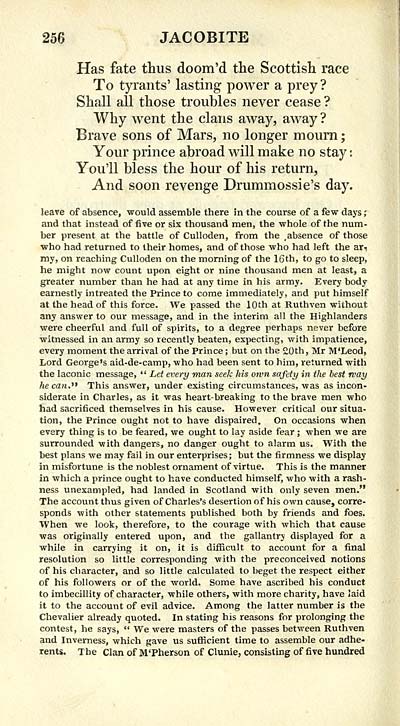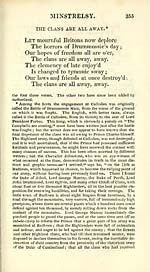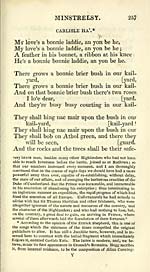Glen Collection of printed music > Printed text > Jacobite minstrelsy
(278) Page 256
Download files
Complete book:
Individual page:
Thumbnail gallery: Grid view | List view

256 JACOBITE
Has fate thus doom'd the Scottish, race
To tyrants' lasting power a prey ?
Shall all those troubles never cease ?
Why went the clans away, away ?
Brave sons of Mars, no longer mourn ;
Your prince abroad will make no stay :
You'll bless the hour of his return,
And soon revenge Drummossie's day.
leave of absence, would assemble there in the course of a few days ;
and that instead of five or six thousand men, the whole of the num-
ber present at the battle of Culloden, from the .absence of those
who had returned to their homes, and of those who had left the ar-,
my, on reaching Culloden on the morning of the 16th, to go to sleep,
he might now count upon eight or nine thousand men at least, a
greater number than he had at any time in his army. Every body
earnestly intreated the Prince to come immediately, and put himself
at the head of this force. We passed the 10th at Ruthven without
any answer to our message, and in the interim all the Highlanders
were cheerful and full of spirits, to a degree perhaps never before
witnessed in an army so recently beaten, expecting, with impatience,
every moment the arrival of the Prince ; but on the 20th , Mr M'Leod,
Lord George's aid-de-camp, who had been sent to him, returned with
the laconic message, " Let every man seek his own safety in the best may
he can." This answer, under existing circumstances, was as incon-
siderate in Charles, as it was heart-breaking to the brave men who
had sacrificed themselves in his cause. However critical our situa-
tion, the Prince ought not to have dispaired. On occasions when
every thing is to be feared, we ought to lay aside fear ; when we are
surrounded with dangers, no danger ought to alarm us. With the
best plans we may fail in our enterprises; but the firmness we display
in misfortune is the noblest ornament of virtue. This is the manner
in which a prince ought to have conducted himself, who with a rash-
ness unexampled, had landed in Scotland with only seven men."
The account thus given of Charles's desertion of his own cause, corre-
sponds with other statements published both by friends and foes.
When we look, therefore, to the courage with which that cause
was originally entered upon, and the gallantry displayed for a
while in carrying it on, it is difficult to account for a final
resolution so little corresponding with the preconceived notions
of his character, and so little calculated to beget the respect either
of his followers or of the world. Some have ascribed his conduct
to imbecillity of character, while others, with more charity, have laid
it to the account of evil advice. Among the latter number is the
Chevalier already quoted. In stating his reasons for prolonging the
contest, he says, " We were masters of the passes between Ruthven
and Inverness, which gave us sufficient time to assemble our adhe-
rents. The Clan of M'Pherson of Clunie, consisting of five hundred
Has fate thus doom'd the Scottish, race
To tyrants' lasting power a prey ?
Shall all those troubles never cease ?
Why went the clans away, away ?
Brave sons of Mars, no longer mourn ;
Your prince abroad will make no stay :
You'll bless the hour of his return,
And soon revenge Drummossie's day.
leave of absence, would assemble there in the course of a few days ;
and that instead of five or six thousand men, the whole of the num-
ber present at the battle of Culloden, from the .absence of those
who had returned to their homes, and of those who had left the ar-,
my, on reaching Culloden on the morning of the 16th, to go to sleep,
he might now count upon eight or nine thousand men at least, a
greater number than he had at any time in his army. Every body
earnestly intreated the Prince to come immediately, and put himself
at the head of this force. We passed the 10th at Ruthven without
any answer to our message, and in the interim all the Highlanders
were cheerful and full of spirits, to a degree perhaps never before
witnessed in an army so recently beaten, expecting, with impatience,
every moment the arrival of the Prince ; but on the 20th , Mr M'Leod,
Lord George's aid-de-camp, who had been sent to him, returned with
the laconic message, " Let every man seek his own safety in the best may
he can." This answer, under existing circumstances, was as incon-
siderate in Charles, as it was heart-breaking to the brave men who
had sacrificed themselves in his cause. However critical our situa-
tion, the Prince ought not to have dispaired. On occasions when
every thing is to be feared, we ought to lay aside fear ; when we are
surrounded with dangers, no danger ought to alarm us. With the
best plans we may fail in our enterprises; but the firmness we display
in misfortune is the noblest ornament of virtue. This is the manner
in which a prince ought to have conducted himself, who with a rash-
ness unexampled, had landed in Scotland with only seven men."
The account thus given of Charles's desertion of his own cause, corre-
sponds with other statements published both by friends and foes.
When we look, therefore, to the courage with which that cause
was originally entered upon, and the gallantry displayed for a
while in carrying it on, it is difficult to account for a final
resolution so little corresponding with the preconceived notions
of his character, and so little calculated to beget the respect either
of his followers or of the world. Some have ascribed his conduct
to imbecillity of character, while others, with more charity, have laid
it to the account of evil advice. Among the latter number is the
Chevalier already quoted. In stating his reasons for prolonging the
contest, he says, " We were masters of the passes between Ruthven
and Inverness, which gave us sufficient time to assemble our adhe-
rents. The Clan of M'Pherson of Clunie, consisting of five hundred
Set display mode to: Large image | Transcription
Images and transcriptions on this page, including medium image downloads, may be used under the Creative Commons Attribution 4.0 International Licence unless otherwise stated. ![]()
| Special collections of printed music > Glen Collection of printed music > Printed text > Jacobite minstrelsy > (278) Page 256 |
|---|
| Permanent URL | https://digital.nls.uk/87929175 |
|---|
| Description | Scottish songs and music of the 18th and early 19th centuries, including music for the Highland bagpipe. These are selected items from the collection of John Glen (1833 to 1904). Also includes a few manuscripts, some treatises, and other books on the subject. |
|---|
| Description | The Glen Collection and the Inglis Collection represent mainly 18th and 19th century Scottish music, including Scottish songs. The collections of Berlioz and Verdi collected by bibliographer Cecil Hopkinson contain contemporary and later editions of the works of the two composers Berlioz and Verdi. |
|---|

